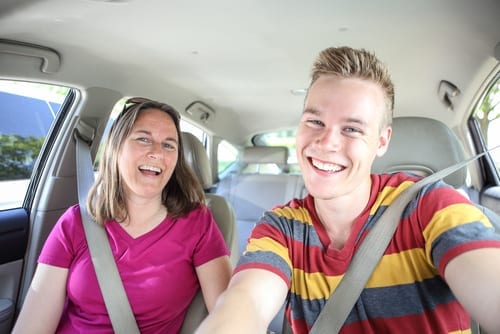Believe it or not, your little preschooler who used to enjoy playing with toy cars is now a newly-minted 16-year-old who just scored their driver’s license. Of course, like any apprehensive parent, you’re proud of your child reaching this important life milestone, but are somewhat reluctant to give them the keys to the car.
Because you want to keep your teen driver as safe as possible behind the wheel, reiterate with them, again and again, the importance of safe driving practices and avoid from being distracted. Here are three important driving tips to discuss with your new teen driver.
1. Car Maintenance
Beyond knowing when to put gas in the car, many 16-year-olds may not have a real sense of what it takes to maintain a vehicle and keep it humming on the open road. With that in mind, set aside a few hours and provide your teen with some key lessons in Car Maintenance 101.
Explain how often your teen should bring their car to a mechanic shop for maintenance and the importance of letting you know right away when a warning light first appears on their dashboard. Additionally, show your teen how to check their car’s oil level and how to measure tread depth and air pressure.
You should also take the time to explain that not all car parts are created equal. For example, when any tires need replacing, it’s important to buy the right replacements for any particular vehicle. In fact, tires have a ply rating that details their strength and capacity, allowing consumers to realize their quality before making any purchase. As a parent, know where to locate this information and explain to your teen driver that it’s crucial they purchase tires with a high ply rating.
2. Texting and Driving
Ensuring your teen driver avoids being distracted while behind the wheel — texting and driving is the biggest culprit — should be your No. 1 priority. According to the CDC, nine people are killed and more than 1,000 are injured every day in crashes that involve a distracted driver.
Knowing this information, parents should explain to their teen driver how anything that takes their attention away from driving is a distraction that could injure or even kill them, a passenger, fellow motorist or nearby bystander. With regard to texting, explain how this practice requires drivers to take their eyes off the road and at least one hand off the wheel.
You can also ask your loved one whether they know any teens who regularly text while behind the wheel and implore them not to get in their car to avoid getting into an accident. To ensure your new driver is not tempted to shoot a quick text while on the road, never do it yourself.
According to Travelers.com, young drivers are influenced by the actions and behaviors of their parents. Thus, if they see you put your smartphone out of reach when on the road and ignore all incoming texts, they will be more likely to do the same.
3. Teen Driving Laws
While your teenager may be chomping at the bit to borrow the car and head to the mall with their friends, many states have laws that limit when a teen can get behind the wheel and the number of passengers allowed in their vehicle. To educate yourself and your teen — and avoid getting pulled over — look up any state-specific laws or ordinances online.
For example, in California, 16-year-olds are first issued an intermediate license that forbids them from driving between the hours of 11 p.m. and 5 a.m. during their first year of driving. Additionally, teens cannot have any passengers in their vehicle age 20 and younger unless another licensed driver age 25 and older is accompanying them.
Maintain an Open Line of Discussion
Speaking with your teen about the responsibilities associated with being a good driver is not a one-shot deal. Stress keeping the lines of communication open between you and your loved one and always be look for new ways to bring up safe driving habits in day-to-day conversation.
By starting with basic car maintenance, the importance of never texting and driving and understanding state-specific teen driving laws, you’ll be giving your new driver a great foundation of knowledge.











